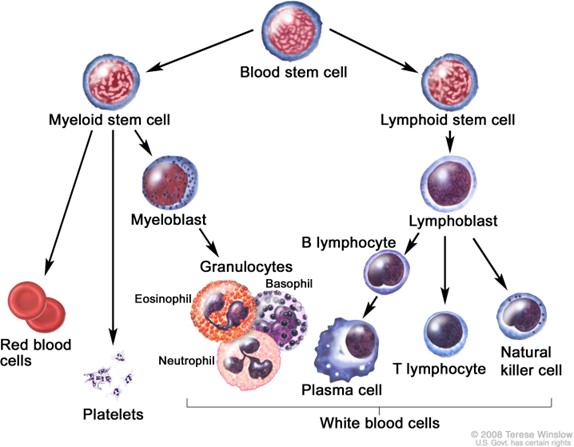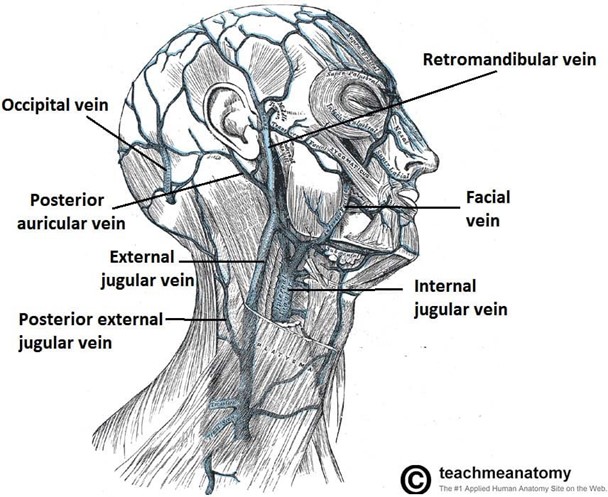B cells divide and differentiate into:
Megakaryocytes.
Plasma cells.
Antibodies.
T cells produce and secrete antibodies.
The Correct Answer is B

B cells are a type of lymphocyte that originate from the bone marrow and are involved in humoral immunity.
When they encounter a foreign substance (antigen), they differentiate into plasma cells, which secrete antibodies.
Antibodies are proteins that bind to the antigen and neutralize it.
Choice A is wrong because megakaryocytes are large cells that produce platelets, not antibodies.
Choice C is wrong because antibodies are not cells, but products of plasma cells.
Choice D is wrong because T cells are another type of lymphocyte that originate from the thymus and are involved in cell-mediated immunity, not antibody production.
Nursing Test Bank
Naxlex Comprehensive Predictor Exams
Related Questions
Correct Answer is C
Explanation

This is because the external jugular vein drains blood from the face and scalp into the subclavian vein.
Some possible explanations for the other choices are:
Choice A. Superior vena cava.
This is wrong because the superior vena cava is a large vein that collects blood from the head, neck, chest, and upper limbs and returns it to the right atrium of the heart.
It does not drain blood from the face and scalp directly.
Choice B. Subclavian vein.
This is wrong because the subclavian vein is a vein that receives blood from the external jugular vein, the internal jugular vein, and the vertebral vein and joins with the internal thoracic vein to form the brachiocephalic vein.
It does not drain blood from the face and scalp directly.
Choice D. Cephalic vein.
This is wrong because the cephalic vein is a vein that runs along the lateral side of the arm from the hand to the shoulder and empties into the axillary vein.
It does not drain blood from the face and scalp at all.
Normal ranges for blood pressure vary depending on age, gender, health status, and other factors, but a general guideline is that systolic blood pressure (the pressure when the heart contracts) should be less than 120 mmHg and diastolic blood pressure (the pressure when the heart relaxes) should be less than 80 mmHg.
Correct Answer is B
Explanation
Cardiac output is calculated by multiplying the stroke volume by the heart rate, not by the systolic blood pressure.
Stroke volume is the amount of blood circulated by the heart with each beat. Heart rate is the number of beats per minute.
Systolic blood pressure is the pressure in the arteries when the heart contracts. Choice A is wrong because it confuses systolic blood pressure with heart rate.
Systolic blood pressure is not directly related to cardiac output, although it can be affected by it.
1: Cardiac Output- Definition, Factors Affecting, Cardiac Index - BYJU’S 2: Cardiac Output (Fick’s Formula) - MDCalc 3: Calculating how much blood is pumped by the heart - Cellular respiration and transport - Edexcel - GCSE Biology (Single Science) Revision - Edexcel - BBC Bitesize 4: Cardiac output - Structure and function of the heart - Higher Human Biology Revision - BBC Bitesize : Blood Pressure: What Is Normal? How To Measure Blood Pressure (healthline.com)
Whether you are a student looking to ace your exams or a practicing nurse seeking to enhance your expertise , our nursing education contents will empower you with the confidence and competence to make a difference in the lives of patients and become a respected leader in the healthcare field.
Visit Naxlex, invest in your future and unlock endless possibilities with our unparalleled nursing education contents today
Report Wrong Answer on the Current Question
Do you disagree with the answer? If yes, what is your expected answer? Explain.
Kindly be descriptive with the issue you are facing.
